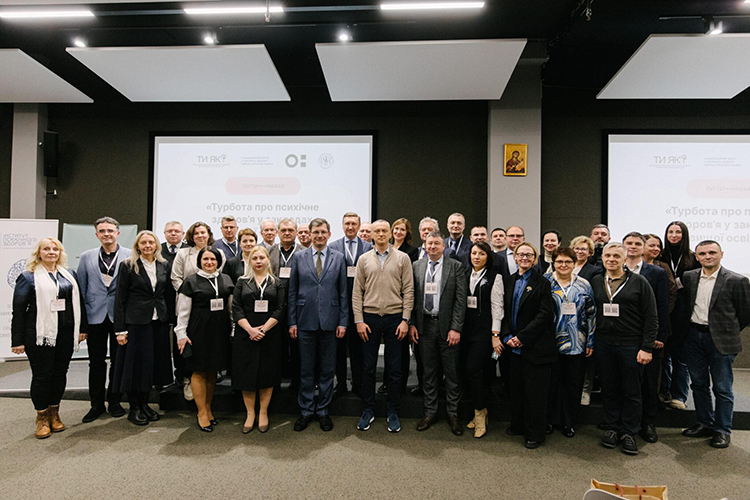The Rector of Bohdan Khmelnytsky National University of Cherkasy took part in the meeting of rectors of Ukrainian universities, which took place on February 26 in Lviv.
The event was aimed at helping HEI to develop an effective mental health care system for students, lecturers, and employees and to respond to the challenges of war in this context. This is stated on the website of Ukrainian Catholic University.
In order to properly help others, the community of the organization must be stable, healthy, and with respect for the dignity of each person. Taras Dobko, Rector of Ukrainian Catholic University, welcoming the participants, emphasized: “We are happy to share our experience and learn from yours as well. Today, we live in debt, at the expense of borrowed time, which is acquired by our defenders. This time should be productive, where our task as an academic community is to generate hope, a vision for the future of our country, as well as how to implement it.”
Oksana Zbitnieva, Head of the Coordination Centre for Mental Health under the Cabinet of Ministers of Ukraine, spoke about the All-Ukrainian Mental Health Program. She shared the results of a global sociological study of mental health in 11 countries, according to which mental health will remain one of the most important challenges for the next 5-20 years. A sociological survey conducted in Ukraine by the Gradus.Research Company showed an increase in the level of stress and nervousness from 71% to 77%. This indicator is the highest among Ukrainian youth. “At the same time, the youth group is the most optimistic about the prospects of their mental state. It is the youth who will become agents of change and leaders of innovations in the field of mental health,” the expert emphasizes.
Andrii Vitrenko, Deputy Minister of Education and Science of Ukraine, spoke about the place and role of higher education institutions in the mental health system. According to him, higher education institutions face three modern challenges. “The first challenge is the training of specialists of the appropriate level who will restore a person. The second important task is taking care of the health of young people and students. World experience shows that the issue of mental health among students is relevant – 41% of young people experience stress after entering university. The third challenge is taking care of lecturers, they are very important. I thank each of you for the resilience you have shown during the war.”
World studies indicate a growing trend of mental disorders that begin before the age of 24. In the UK, between 2016 and 2023, the percentage of the youth admitting to having mental health problems increased from 6% to 16%. Research on the impact of Covid-19 also found that young people are the most vulnerable segment of the population. All these data indicate the importance of the topic of mental health.
Oleh Romanchuk, psychotherapist, lecturer at UCU, Director of the UCU Institute of Mental Health, adds that one of the main causes of death of young people is suicide: “Sometimes we think that children with mental health disorders come from dysfunctional families. But it can happen to any young person. The psyche at this age is like a big house that opens up great opportunities, but has many corridors in which you can get lost. It is important for us to help young people not to end up in the dead end of depression or anxiety disorder. One of the main reasons why young people do not complete university is mental health problems. This is a common issue that has a great impact on the social functioning of a young person and their future.”
How can universities implement mental health care? – Oleh Romanchuk talked about 5 practical recommendations:
Each institution should have a comprehensive mental health care program that is integrated into the wider network.
Education programs for students should include appropriate disciplines related to mental health.
Institutions should have appropriate psychosocial support services.
Community and collective resilience must be nurtured.
Lecturers should have a specific training and support program regarding their role in the mental health care system for students, as well as support in looking after their own psychological well-being.
The second and third parts of the meeting were devoted to the group work of the participants on the topic of how to elaborate strategies for the development of a holistic system of mental health care.
– Universities should become centres of mental health. The issue is particularly relevant today, because it is the youth who are fighting for victory and will rebuild Ukraine after the war. “Let’s restore a person – a person will restore everything” – these words of Olena Zelenska became the slogan of the All-Ukrainian program “How are you?” initiated by her.
Personally, it was important for me to understand that Bohdan Khmelnytsky National University of Cherkasy is moving in the right direction. This is a psychological support service from the first days of the war, optional thematic courses for students of all majors, a system of psychological support for the youth and much more.
In fact, everything we do – help to the army, national-patriotic and educational activities – is aimed at preserving mental health.
It was interesting to hear about the experience of colleagues, learn the results of scientific research, get new methods and developments that will be applied in practice.
I see the task for myself and the team in the creation of a mental health research centre to be a “fortress of resilience”.
https://cdu.edu.ua/en/news-en/educationalists-discussed-the-topic-of-mental-health-care-in-universities.html#sigProIda0920275c9













